|
| |
 
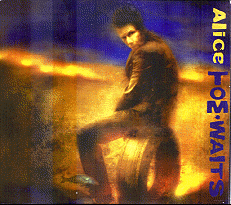 |
Tom
Waits had wanted to record the music from
his musical Alice since it was originally staged in 1992.
However, problems with his old record label Island slowed down the process,
undoubtedly stemming back to the fact a similar project for The Black
Rider had led to one of Waits’ more impenetrable and slowest selling
albums. So, even though the music from Alice was a lot more
digestible, it was unavailable to Waits' fans, except through low-quality
bootlegs of the songs.
Finally, Waits is releasing official disks of not only this show, but also
his musical Woyzeck (renamed on album Blood Money.)
Of the two albums, Alice is the
more immediately accessible… if any album with the quirky, thorny likes of “Kommienezuspadt,”
“Table Top Joe,” and “We’re All Mad Here” could be labeled accessible.
However, Alice has a gentleness, a poetic sense of woe and a
throbbing, beautiful suffering that is almost mournful. For the most part,
the album eschews the carnival-like musical atmosphere that Waits has been
experimenting with since Swordfishtrombones for a more classical
feel. Alice is a mix of Brechtian balladry, Dixieland jazz, and
chamber music.
The song cycle starts in
with the delicate, jazzy title track. “Alice” is a quiet, sax-laden ballad
that would feel at home on one of Waits’ Elektra albums. However, despite
the refined musical backing, the lyrics catalogue a feeling of obsession.
The words work in the framework of the musical about writer Lewis Carroll’s
strange relationship with young Alice. It also resonates outside the
structure of the story, showing how people can become fixated on another
person, even when they know that it is not what is best for them.
There are other
unbearably fragile songs like “Flower’s Grave,” “Lost in the Harbour,” and
“No One Knows I’m Gone,” which bleed like an open wound. Ghosts of lost
opportunities and squelched desires disappear into the quickly receding fog
of life. Which is not to say that Alice is just a long group of
lamentful ballads. “Kommeniezuspät” has Waits spouting guttural
foreign-sounding words (and some occasional English ones) over a racing
horn-laced calliope tune.
Alice
continues Waits’
musical fascination with the deformed. “Table Top Joe” is an old-fashioned
ragtime workout about a man who is born with just a head, no body. However,
instead of letting his deformity destroy him, Joe uses it to his advantage,
putting together an act and becoming a vaudeville star. Not all of
Waits’
freaks are so lucky, though. “Poor Edward” tells the tragic story of a man
who was literally “two-faced”; he had the full face of a woman on the back
of his head. She was Edward’s doppelganger, constantly belittling him and
tempting him with evil thoughts. Eventually the face drives Edward to
madness and suicide. These two songs are the opposite sides of a fever
dream.
This dichotomy of joy
and pain comes naturally to Waits as a songwriter.
It's why thirty years into his career, he has yet to make a bad album.
Alice
is probably the better of the two new albums for the uninitiated.
However, it is still starkly, beautifully Waits' offbeat view of life and
music. You won't be the same after you've experienced it.
(5/02)
Jay S. Jacobs |
RETURN TO RECORD
REVIEWS MENU

 

Copyright © 1992-2002 PopEntertainment.com All rights reserved.
|
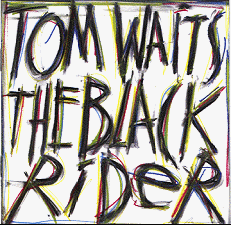 |
This is not really what you might call the new album by
the eccentric Tom Waits. It's more of a side project, the soundtrack of a musical Waits
put together with William S. Burroughs that played in Hamburg last year and New York City
this fall. Based on an old German legend, The Black Rider is actually Waits'
attempt to construct a German dance hall musical in the vein of Kurt Weill and Bertol
Brecht.
As such, the music has more of a central theme and theatrical feel than
Waits' more experimental works of the past decade. Many of the songs have the
feeling of a haunted carnival, from the barker-from-Hell lyrics of "Lucky Day
Overture" and swirling calliope of the title track to the sudden interludes of what
seems to be the theme of a cowboy movie that spice up "Just the Right Bullets."
The problem is the music probably works better in its intended theatrical context:
off the stage it loses the coherence of the central idea. Also, while cool in
theory, it was a bad idea to let Burroughs do the vocals on "T'ain't No Sin."
While The Black Rider isn't essential Waits, it's still interesting.
This is just a weird pit-stop along the road of a fascinating career. (1/94)
Jay S. Jacobs |
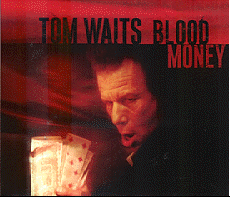 |
Of the two
concurrently released theatrical albums,
Blood Money
tends to be a darker,
more acidic, yet less emotionally draining, listen. It also delves more
into the tonal experimentation of Waits’ later music. This probably stems
from the bleak storyline of the source material, the musical Woyzeck.
Musically as well as
lyrically, Blood Money is more jagged, more screaming, more
percussive. It has a playful black sense of humor behind the apocalyptic
yowls of anger. “Misery Is the River of the World” contradicts an enraged
howl at the moon on the human conditions with a carnival oom-pah band
backing. A subtle samba beat percolates underneath the resigned bitterness
of “Everything Goes To Hell.” More stomping, clanging instrumentation
reminiscent of Bone Machine appears on “God’s Away on Business” as
Waits spits out every word with poisonous bile only experienced by the
betrayed. A similar sense of mental instability crops up in the raging
“Starving in the Belly of the Whale.” The instrumental “Knife Chase” weds a
martial backbeat to a spy film throb.
Strangely, in the
middle of all this dark experimentation, there are a couple of Waits' more
touchingly romantic songs. Over a soft old-fashioned bed of music, “Coney
Island Baby” features a lead played on a chamberlain. Waits reserves his
simplest lyrics of straightforward devotion, calling his love a princess, a
rose, a pearl. Much like earlier songs like “Johnsburg, Illinois” and
“Jersey Girl,” it celebrates the little, subtle moments in a relationship.
The song closes out with a piano quote from “Innocent When You Dream.” The
next song, “All the World Is Green” is a similarly lovely ballad about
trying to remember the moments when romance is pure and possibilities are
endless. There is also a lovely sense of desperate romantic resignation on
the charming tunes “Another Man’s Vine” and “The Part That You Throw Away.”
(5/02)
Jay S. Jacobs |
|
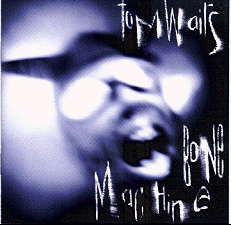 |
The spectre of death covers Tom Waits' new album Bone
Machine like a pall. Much like Lou Reed's Magic and Loss, the album is
a full-length meditation on mortality. Even the songs that don't deal directly with
life or death issues carry the somber mood in their sparse arrangements and Waits'
tortured vocals.
As with all his work since signing with Island, Bone Machine
sneaks up on you. Many of the songs are not obviously musical, yet you keep coming
back to them and are fascinated by some new aspect with each listening. Waits really
is one of today's most seductive songwriters. His work has been covered -- Rod
Stewart did "Downtown Train" and Springsteen did "Jersey Girl," -- but
his best originals remain unfamiliar to most people.
Some musicians make a career
out of trying to clean up the rough edges in the studio. Waits believes an album
should be almost all rough edges. Much of the music here is dauntingly minimalist.
This focuses attention on the basic song structures, which are quite simply
fascinating. "The Ocean Doesn't Want Me" is a musical suicide note with
spooky instrumentation and a vocal that almost sounds like it was performed by someone
drowning. "The Earth Dies Screaming" has the resonance of an apocalypse,
with tortured vocals and bizarre percussion. "Black Wings" continues to
solidify Waits' reputation as one of our greatest bohemian poets, backed by a tune that
sounds like it's out of a Sergio Leone spaghetti western.
This is not to say that
all the songs on Bone Machine are strange. There is a lovely ballad called
"Who Are You?" that will most likely become the next tune some adventurous
artist covers. The con man in "Jesus Gonna Be Here" is the same type of
tortured dreamer that Waits has been drawing vividly for years. "A Little
Rain" feels like it comes from an old Kurt Weill theatrical score, and the disk
closes out with the Keith Richards duet "That Feel."
Waits' music may be
difficult for some people, especially on first listen, but twenty years into his career he
is still challenging himself and his audience, and not many artists can match that. (12/92)
Jay S. Jacobs |
|
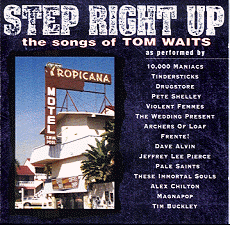 |
Tom Waits is the best songwriter
of this generation, yet many people are scared away from his songs by his midnight,
cigarettes and whiskey vocal style. You can just see a record company exec pondering how
to sell Waits' music to the masses. Suddenly a lightbulb goes on over his head. Tribute
album! Well, all tribute albums are a mixed bag, so I wasn't expecting too much, but I'm
pleasantly surprised how little of a sell-out this is.
The artists involved may change up
Waits' music a bit, but they remain stubbornly true to his musical vision. For example, in
its own way, the Violent Femmes' take on the title track is as disquieting as anything the
master himself has done, and the Femmes strongest moment yet. Pete Shelley turns
"Better Off Without A Wife" into a great punk anthem, Magnapop deconstructs
"Christmas Card From A Hooker In Minneapolis" and The Tindersticks deceptively
pretty musical yet vocally dead version of "Mockingbird" captures the songs'
self-pity and loathing. Even the more straight forward songs work, 10,000 Maniacs version
of "I Hope That I Don't Fall In Love With You," with it's minute story-telling
detail, would have fit snuggly on any of the band's albums. Get this album, learn to love
the songs, then seek out the sources. (4/96)
Jay S. Jacobs
Copyright © 1992-2002 PopEntertainment.com All rights reserved. |

|